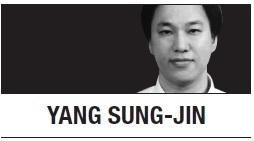[Digital Simplicity] Working from home brings its own challenges
By Yang Sung-jinPublished : March 6, 2020 - 09:54

As the novel coronavirus spreads, a growing number of office workers in South Korea and elsewhere are being pushed out of their cozy cubicles and forced to work remotely. However, if you’re working remotely, your humble abode is not always home sweet home.
My general perception of working from home is mixed. As a journalist, I have spent most of my career working remotely. I usually commuted to and from the government agencies or companies that I covered, and returned to the newsroom only when there was a meeting with editors and other reporters.
So I have no qualms or doubts about working outside the newsroom, since the alternative workplace is usually formal briefing rooms or occasionally coffee shops. These public places keep me in a state of mild tension and constantly reminded of other people working nearby.
But working from home is an entirely different matter.
The foremost challenge in working from home is that there are too many distractions, and there’s not much I can do to get rid of them unless I get out of the house.
The couch, bed and even the floor are all beckoning me irresistibly, inviting me to move from my working desk and have a rest. Temptations of this sort are so powerful that I need some drastic measures to keep me seated. Perhaps I should rig some contraption to strap myself to my chair with shiny steel chains that unlock according to a preset timer.
I believe that the most lethal item is none other than the almighty smartphone. Since there is no third-party observer, I am fearful that I might fall for the trap of checking all the news related to the coronavirus, including real-time updates about the number of confirmed patients across the globe, on Twitter, Facebook and Korean portal sites.
However, I cannot turn off this distraction machine, largely because it’s a key tool in my work regardless of where I am.
Mobile apps are also a huge distraction and a potential disruptor. I know I have to turn off the notification function for personal messages on Kakao Talk and other mobile apps to stay focused. But it’s not easy to entirely cut off the constant stream of notifications, messages and email, since these tools, quite regrettably, serve both personal and business purposes.
On Monday morning, a lot of Koreans working from home, especially those who joined the remote work bandwagon for the first time due to the coronavirus scare, were surprised and perplexed to find their Kakao Talk malfunctioning for a while. It was a technical problem, but the impact was national, as more than 90 percent of Koreans are estimated to use the mobile messenger app for various purposes, including sharing their worries about the rapidly shrinking inventory of face masks.
Why do remote or stay-home workers in Korea use a mobile messenger developed by a private company for their core business tasks? It’s because, except for some big conglomerates and multinational firms, most Korean companies are not prepared for this kind of situation. Small and midsized firms cannot afford to build up a set of mobile tools and detailed procedures for working from home.
Without well-documented guidelines, some Korean workers are flocking to coffee shops to handle their business. Starbucks and other major coffee chains are suddenly crowded with students and workers brandishing their laptops and tablet computers. It is not hard to see customers remove their masks to gulp down the latte and Americano, and work a couple of hours at a coffee shop.
The idea of working from home is to help prevent the spread of the coronavirus by adopting what is called “social distancing.” The ironic popularity of coffee shops as an alternative workplace, despite all the known risks in such public places, sheds light on how difficult it is to work from home.
By Yang Sung-jin (insight@heraldcorp.com)
Yang Sung-jin is the multimedia editor of The Korea Herald. -- Ed.












![[Today’s K-pop] BTS pop-up event to come to Seoul](http://res.heraldm.com/phpwas/restmb_idxmake.php?idx=644&simg=/content/image/2024/04/17/20240417050734_0.jpg&u=)





![[KH Explains] Hyundai's full hybrid edge to pay off amid slow transition to pure EVs](http://res.heraldm.com/phpwas/restmb_idxmake.php?idx=652&simg=/content/image/2024/04/18/20240418050645_0.jpg&u=20240419100350)

